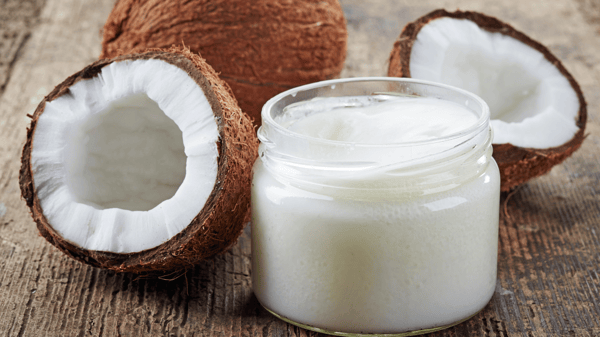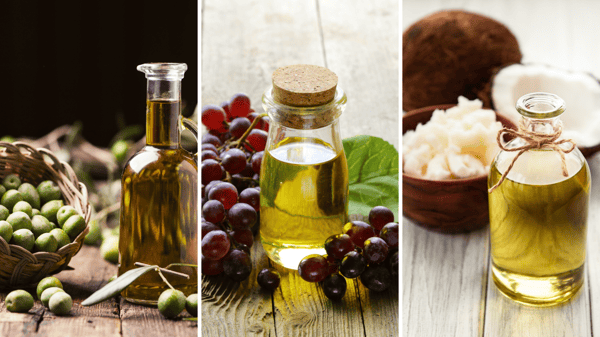Just like Smash Mouth’s “All Star” hit, coconut oil is past its peak but still appears in our daily lives. Touted as a belly fat blaster, an appetite suppressant and even an Alzheimer's treatment, coconut oil rose to prominence in 2015 and still lingers in grocery stores, food blogs, and nostalgic Dreamworks animated movies today (okay, you know I had to reference Shrek somewhere in here). However, where are we now with these claims? And most importantly: should I be cooking and baking with it this holiday season?
 Far Far Away Land of Fats
Far Far Away Land of Fats
First, let’s dip into the far far away land (it’s going to keep happening, sorry) of fats. There are three main types: trans, saturated, and unsaturated. Think of trans fats as Lord Farquaad: the smug, bad guy. Trans fats are directly linked to increased LDL cholesterol levels and risk of heart disease, and thus have been banned from the manufactured food industry, where we humans largely created them, since 2015. Unsaturated fats are liquid at room temperature (they’re not “saturated” with hydrogen atoms, so there are more “spaces” (or double bonds) in their structure, so they can’t pack together nicely to form solids) and come mainly from plant sources such as olive oil, avocados, nuts and seeds. Think of these as Princess Fiona: flexible and good for the heart. Saturated fats are like the three little pigs, they exist and can contribute... to an extent, but overall aren’t the most helpful and are best enjoyed in small amounts. Think of butter, lard, and dairy fats; these are all solid at room temperature because all their molecules are “saturated” with hydrogens, forming a uniform pattern, and therefore, packing closely together. While these are recommended to be limited in our diets by multiple professional health organizations, they do play certain roles in the culinary world such as butter for baking and we don’t have to eliminate them completely from our diets.
 Olive oil, grapeseed oil, coconut oil
Olive oil, grapeseed oil, coconut oil
Coconut Oil: the Pinocchio of Fats
Where does coconut oil fit into this? Well, coconut oil is a little bit of a Pinocchio. It actually contains more saturated fat (90%) than butter (64%). However, it’s often been perceived as “healthier” because of its content of “medium-length” fatty acids. Short-length and medium-length fatty acids are absorbed and metabolized differently than longer fatty acids (this is where the dragon claws of health marketing sunk into), but the research behind coconut oil’s “benefits” thus far is limited, small, and also suggests negative effects as well.
Biggest Gingerbread Houses of Claims and Current Research
Here are some of the biggest coconut oil claims and the current science:
- Promotes weight loss
- Much of this research centers around the fact that coconut oil contains medium-chain triglycerides (MCT’s). However, studies use MCT oil in studies, which is 100% MCT’s while coconut oil only contains about 15% of MCT’s (most of its fatty acids are slightly longer). This means the majority of coconut oil exhibits different properties than what was studied and you’d have to eat A LOT of coconut oil to get the same amount of MCT’s used. Also, these studies are small and the small amounts of inches and weight lost by participants could have been from other factors that they changed throughout the study (such as exercise).
- Reverses dementia and Alzheimer’s disease
- Some theories imply that coconut oil helps with Alzheimer’s and other neurological disorders on the basis of producing ketones (which are byproducts of the breakdown of fats that are produced when the body’s main source of fuel, glucose, isn’t available in necessary amounts). However, there just isn't any credible science to support this idea and therefore, the Alzheimer’s Association itself does not recommend coconut oil as a treatment.
- Reduces cardiovascular disease (CVD) risk
- While some studies seem to show that coconut oil can raise HDL cholesterol levels (the good kind of cholesterol), the research is inconclusive and other studies also show that coconut oil increases LDL cholesterol (the bad kind), total cholesterol, and triglyceride levels to a greater, if not similar, degree as other saturated fats.
Fairy-Tale Ending?
Coconut oil’s health benefits are largely not supported by research at this time, and it’s important to remember that it’s still a saturated fat, which we know if we have too much, can have detrimental effects on our health, including increasing our risk of cardiovascular disease. There are other oils (i.e. soybean oil, olive oil, etc.) that are supported by research to have beneficial effects such as increasing HDL cholesterol and lowering LDL cholesterol that are better oils to use more often.
However, coconut oil has a wonderful, distinct flavor, has been used for years by many cultures, and is a popular, vegan alternative to butter in baking. Check out our Caribbean Cruise Demo class on Saturday, November 20th, or these blog posts on chickpea curry, shrimp noodle soup, or blueberry scones to see how to use coconut and other oils.
 Overall, coconut oil (and other saturated fats) are not villains that must be exterminated, they are a part of our food systems, cultures, and should be enjoyed in the same way that we enjoy fairy tales: not every moment of every day, but in small, delicious, and beautiful moments. The End.
Overall, coconut oil (and other saturated fats) are not villains that must be exterminated, they are a part of our food systems, cultures, and should be enjoyed in the same way that we enjoy fairy tales: not every moment of every day, but in small, delicious, and beautiful moments. The End.











